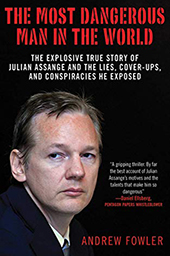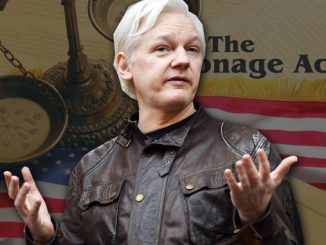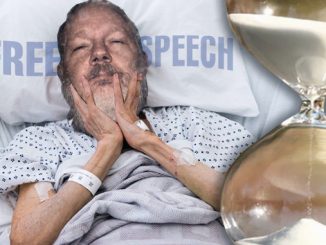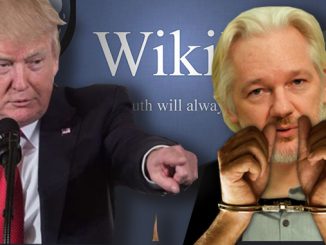
By S.T. Patrick
As America’s leading journalists continue to bicker self-righteously over the timing of Bob Woodward’s publicly released tapes made with President Trump in preparation for a new book, freedom of the press continues to wilt away in a courtroom in London where WikiLeaks founder Julian Assange fights extradition to the U.S.
Assange, a 48-year-old Australian, is fighting extradition to a country where—if he should lose a trial—he faces up to 175 years in prison for revealing to the public classified U.S. intelligence documents and videotapes. Assange and his team of attorneys have charged that his global prosecution has been a direct assault on press freedoms and whistleblowers. He once faced rape charges in Sweden, but those were dropped due to a clear lack of evidence. Since Ecuador’s embassy in England rescinded his political asylum in 2019, Assange has been held in Belmarsh Prison outside of London. The extradition trial was originally scheduled for the spring of 2020 but was pushed back to September due to the coronavirus.
Assange was technically jailed in England for violating the Bail Act, but his imprisonment has transparently been a political one. While jailed, the judge has refused to release him for coronavirus-related fears, he has been kept in solitary isolation for most of his incarceration, and there have been multiple instances when advocates and attorneys who have met with Assange, during the rare visits allowed, have feared that his health was deteriorating at such a rapid pace that he could die in prison. Yet that is exactly where he stayed, primarily for exposing U.S. military and government war crimes.
The extradition trial has to date been a show trial that strongly resembles a legal circus. The defense’s first witness was Professor Mark Feldstein of the University of Maryland, who attempted to appear via video link from the United States. Of course, Feldstein was beset by technical glitches and his first words were, “I’m having a hard time hearing you.” Feldstein, the author of Poisoning the Press: Richard Nixon, Jack Anderson, and the Rise of Washington’s Scandal Culture, is an expert in the practices and ethics of investigative journalism. He argued that leaks are daily occurrences in the American media and that most are actually perpetrated by government officials. He strongly argues that the reason they don’t get punished with legal action is because it would severely threaten the First Amendment. It was at this point that Feldstein’s link to the courtroom died. Author Noam Chomsky is on the list of potential witnesses for Assange. The American linguist will discuss the political motivations behind the Assange extradition.
The most accurate descriptions of the trial thus far have called it “Kafkaesque,” “a kangaroo court,” or a “Stalinist show trial.”
At one point on the first day, there was even confusion as to which charges were active. Assange’s attorneys seemed confused, and the judge continued to hear arguments from the prosecution over the “expertise” of Assange witnesses.
At the end of the first day, exiled whistleblower Edward Snowden tweeted, “The judge permits the charges to be changed so frequently the defense doesn’t even know what they are, the most basic demands are denied, no one can hear what the defendant says—it’s a farce.”
The second day saw the judge berate and threaten Assange when the defendant said, “This is nonsense” aloud in court. At one point, there was a debate regarding whether or not the Barack Obama administration decided to prosecute Assange. They never filed charges, so the answer seems abundantly clear, yet the prosecution kept trying to push the idea that an American administration had not decided to not prosecute Assange. The prosecution had also given defense witnesses 24 hours to peruse 350-plus-page bundles of information, only to act shocked and appalled when the witness was not fully prepared in court.
Amidst all this there existed coronavirus concerns, tests, the public announcing of results, and multiple postponements. The Assange trial continues as of the writing of this article, but the major news networks have covered little of it other than Assange being scolded in court.
Some of the finest independent journalists and commentators today have been live-tweeting about the court proceedings as they have progressed. Glenn Greenwald of “The Intercept” wrote, “The greatest threat to press freedom since 2016—the ongoing attempt by the DOJ to extradite Assange in connection with publishing documents—is underway in the UK, and U.S. journalists who spent four years flamboyantly depicting themselves as free press warriors are largely silent.”
Edward Curtin, the author of Seeking Truth in a Country of Lies, wrote, “Imagine this: Assange was Russian, and that he released information about Russian war crimes, political corruption etc. and was then tortured and jailed. Who in the U.S., liberal or conservative, would possibly believe the Russian government’s accusations that he was a criminal?” In all of this, Assange has been given sparse opportunities to meet with his own legal team. The judge continually has acted like a favor was being done to allow Assange to meet with his team for an hour during the trial. Assange’s isolation has been part of the psychological torture that he has endured for the past year.
Just in case there was a possibility that this case couldn’t get any more carnival-like, here come the dancing elephants. There are pro-Assange followers of QAnon who actually want Assange to lose the trial. The convoluted theory is that Assange will then be extradited to the U.S. where Trump can pardon him and forever set free the journalistic freedoms that have plagued the scribes since George Washington. If that is true, the next logical question is, “What happens if Trump loses on Nov. 3?” The answer, the dream of the fairies: “He won’t.” This is where we are in 2020 as press freedom is challenged by two countries that are supposed to be forces for freedom in the world.
Woodward’s timing will be debated as part of “Issues in Journalism” courses in America’s leading journalism schools for decades to come, as the fate of Assange lingers, paling by comparison to Woodward in the attention the WikiLeaks founder is receiving, yet more consequential to the fate of journalism as a watchdog of governmental malfeasance, to the future of citizen reporting, and to the very definition of journalism as the fifth estate. Freedom of press in the United States now hangs in the balance, waiting to see if the bridge of human rights that London and Washington, D.C. have long championed will indeed fall down.
Assange is not without supporters globally. He does not stand alone. Over 100 notable political figures from 27 countries have in tandem denounced the entire extradition trial. These include 13 present and former heads of state, politicians, and religious figures. Assange has also been supported widely by the new era of journalists on both the political right and left. While the bedrock dinosaurs of old journalism have proclaimed to anyone that would listen that Assange is most certainly not a journalist, he has the support and encouragement of some of the most widely read journalists working online today. All are demanding the trial be ended and Assange be set free immediately.
International leaders supporting an end to the legal carnival against Assange include British Labour Party leader Jeremy Corbyn, Spain’s former Prime Minister Luis Zapatero, two former presidents of Brazil, two former presidents of Argentina, members of the British, Australian, and European parliaments, and many more. One American has stood publicly with this group: former Texas Rep. Ron Paul.
There has been a legal backlash against the process to extradite the WikiLeaks founder as well. A group of nearly 200 international lawyers, legal academics, judges, and legal associations have risen in support of ending the trial.
UK Parliament member Kenneth MacAskill told British media members, “This is a political crucifixion, not legal process, and is about seeking to bury truth and those exposing it.”
Assange is facing U.S. prosecution under the Espionage Act of 1917, an act which, in 1919, the Supreme Court declared was not a freedom of speech violation. The list of those charged under the act is a who’s who of American dissent and covert intelligence operatives that includes Eugene V. Debs, Emma Goldman, Joseph Franklin Rutherford, Julius and Ethel Rosenberg, Daniel Ellsberg, Bradley (Chelsea) Manning, Aldrich Ames, Robert Hanssen, John Kiriakou, and Edward Snowden.
Assange’s defense team is arguing that the prosecution is political and, therefore, violates the U.S.-UK extradition treaty. The testimony of journalist Cassandra Fairbanks has been crucial in that fight. Fairbanks testified that Arthur Schwartz, a member of President Trump’s inner circle in 2016, told her that the U.S. would have Assange removed from the Ecuadorian embassy in London. Fairbanks also learned from Schwartz that Assange would be charged only with the information leaked through Manning. It was Richard Grennell, who was then the ambassador to Germany and later the director of national intelligence, who brokered the deal with Ecuadorian leaders. Fairbanks then traveled to London and told Assange what Schwartz had relayed to her, much to the chagrin of Schwartz himself. Fairbanks, an active Twitter user, tweeted what had happened, causing Grennell to contact her employer, news analysis

website “The Gateway Pundit,” attempting to get her fired. Schwartz called her, panicked that an investigation was underway to discover who had leaked the information to Fairbanks. She has since posted that call publicly for self-protection. Schwartz, she reported, has also told her that Assange and his WikiLeaks co-workers deserved “lethal injections.” Though President Trump ordered the arrest of Assange, Fairbanks’s reportage of the Assange arrest information she received was not a political move. Fairbanks is a former leftist who has now been labeled a bane to the new left since she came out in support of Trump in 2016.
S.T. Patrick holds degrees in both journalism and social studies education. He spent 10 years as an educator and now hosts the “Midnight Writer News Show.” His email is [email protected]. He is also an occasional contributor to TBR history magazine and the current managing editor of Deep Truth Journal (DTJ), a new conspiracy-focused publication available from the AFP Online Store.






